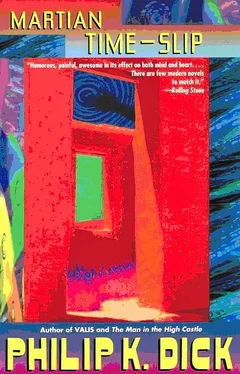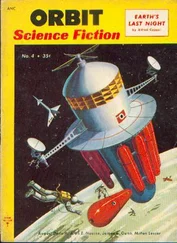“Sheep are funny,” the Whitlock said. “Now, you look at how they behave when you throw some grub over the fence to them, such as corn stalks. Why, they’ll spot that from a mile away.” The Whitlock chuckled. “They’re smart when it comes to what concerns them. And maybe that helps us see what true smartness is; it isn’t having read a lot of books, or knowing long words . . . it’s being able to spot what’s to our advantage. It’s got to be useful to be real smartness.”
Kneeling down, Jack began unscrewing the back from the Angry Janitor. The master circuit of the school stood watching.
This machine, he knew, went through its song-and-dance in response to a reel of instruction tape, but its performance was open to modification at each stage, depending on the behavior of its audience. It was not a closed system; it compared the children’s answers with its own tape, then matched, classified, and at last responded. There was no room for a unique answer because the Teaching Machine could recognize only a limited number of categories. And yet, it gave a convincing illusion of being alive and viable; it was a triumph of engineering.
Its advantage over a human teacher lay in its capacity to deal with each child individually. It tutored, rather than merely teaching. A teaching machine could handle up to a thousand pupils and yet never confuse one with the next; with each child its responses altered so that it became a subtly different entity. Mechanical, yes--but almost infinitely complex. The teaching machines demonstrated a fact that Jack Bohlen was well aware of: there was an astonishing depth to the so-called “artificial.”
And yet he felt repelled by the teaching machines. For the entire Public School was geared to a task which went contrary to his grain: the school was there not to inform or educate, but to mold, and along severely limited lines. It was the link to their inherited culture, and it peddled that culture, in its entirety, to the young. It bent its pupils to it; perpetuation of the culture was the goal, and any special quirks in the children which might lead them in another direction had to be ironed out.
It was a battle, Jack realized, between the composite psyche of the school and the individual psyches of the children, and the former held all the key cards. A child who did not properly respond was assumed to be autistic--that is, oriented according to a subjective factor that took precedence over his sense of objective reality. And that child wound up by being expelled from the school; he went, after that, to another sort of school entirely, one designed to rehabilitate him: he went to Camp Ben-Gurion. He could not be taught; he could only be dealt with as ill .
Autism, Jack reflected, as he unscrewed the back of the Angry Janitor, had become a self-serving concept for the authorities who governed Mars. It replaced the older term “psychopath,” which in its time had replaced “moral imbecile,” which had replaced “criminally insane.” And at Camp B-G, the child had a human teacher, or rather therapist .
Ever since his own son David had entered the Public School, Jack had waited to hear the bad news, that the boy could not be graded along the scale of achievement by which the teaching machines classified their pupils. However, David had responded heartily to the teaching machines, had in fact scored very high. The boy liked most of his Teachers and came home raving about them; he got along fine with even the most severe of them, and by now it was obvious that he had no problems--he was not autistic, and he would never see the inside of Camp B-G. But this had not made Jack feel better. Nothing, Silvia had pointed out, would make him feel better. Only the two possibilities lay open, the Public School and Camp B-G, and Jack distrusted both. And why was that? He did not know.
Perhaps, he had once conjectured, it was because there really was such a condition as autism. It was a childhood form of schizophrenia, which a lot of people had; schizophrenia was a major illness which touched sooner or later almost every family. It meant, simply, a person who could not live out the drives implanted in him by his society. The reality which the schizophrenic fell away from--or never incorporated in the first place--was the reality of interpersonal living, of life in a given culture with given values; it was not biological life, or any form of inherited life, but life which was learned . It had to be picked up bit by bit from those around one, parents and teachers, authority figures in general . . . from everyone a person came in contact with during his formative years.
The Public School, then, was right to eject a child who did not learn. Because what the child was learning was not merely facts or the basis of a money-making or even useful career. It went much deeper. The child learned that certain things in the culture around him were worth preserving at any cost. His values were fused with some objective human enterprise. And so he himself became a part of the tradition handed down to him; he maintained his heritage during his lifetime and even improved on it. He cared. True autism, Jack had decided, was in the last analysis an apathy toward public endeavor; it was a private existence carried on as if the individual person were the creator of all value, rather than merely the repository of inherited values. And Jack Bohlen, for the life of him, could not accept the Public School with its teaching machines as the sole arbiter of what was and what wasn’t of value. For the values of a society were in ceaseless flux, and the Public School was an attempt to stabilize those values, to jell them at a fixed point--to embalm them.
The Public School, he had long ago decided, was neurotic. It wanted a world in which nothing new came about, in which there were no surprises. And that was the world of the compulsive-obsessive neurotic; it was not a healthy world at all.
Once, a couple of years ago, he had told his wife his theory. Silvia had listened with a reasonable amount of attention and then she had said, “But you don’t see the point, Jack. Try to understand. There are things so much worse than neurosis.” Her voice had been low and firm, and he had listened. “We’re just beginning to find them out. You know what they are. You’ve gone through them .”
And he had nodded, because he did know what she meant. He himself had had a psychotic interlude, in his early twenties. It was common. It was natural, And, he had to admit, it was horrible. It made the fixed, rigid, compulsive-neurotic Public School seem a reference point by which one could gratefully steer one’s course back to mankind and shared reality. It made him comprehend why a neurosis was a deliberate artifact, deliberately constructed by the ailing individual or by a society in crisis. It was an invention arising from necessity.
“Don’t knock neurosis,” Silvia had said to him and he understood. Neurosis was a deliberate stopping, a freezing somewhere along the path of life. Because beyond lay--.
Every schizophrenic knew what lay there. And every exschizophrenic, Jack thought, as he remembered his own episode.
The two men across the room from him gazed at him queerly. What had he said? Herbert Hoover was a much better head of the FBI than Carrington will ever be . “I know I’m right,” he added. “I’ll lay you odds.” His mind seemed fuzzy, and he sipped at his beer. Everything had become heavy, his arm, and the glass itself; it was easier to look down rather than up. . . . He studied the match folder on the coffee table.
“You don’t mean Herbert Hoover,” Lou Notting said. “You mean J. Edgar--“
Christ! Jack thought in dismay. Yes, he had said Herbert Hoover, and until they had pointed it out it seemed O.K. What’s the matter with me? he wondered. I feel like I’m half asleep. And yet he had gone to bed at ten the night before, had slept almost twelve hours. “Excuse me,” he said. “Of course I mean . . .” He felt his tongue stumble. With care he said, “J. Edgar Hoover.” But his voice sounded blurred and slowed down, like a turntable losing its momentum. And now it was almost impossible for him to raise his head; he was falling asleep where he sat, there in Notting’s living room, and yet his eyes weren’t closing--he found when he tried that he couldn’t close them. His attention had become riveted on the match folder. Close cover before striking, he read. Can you draw this horse? First art lesson free, no obligation. Turn over for free enrollment blank. Unblinking, he stared on and on, while Lou Notting and Fred Clarke argued about abstract ideas such as the curtailment of liberties, the democratic process . . . he heard all the words perfectly clearly, and he did not mind listening. But he felt no desire to argue, even though he knew they both were wrong. He let them argue on; it was easier. It simply happened. And he let it happen.
Читать дальше









